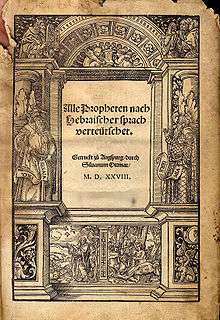Hans Denck
Hans Denck (c. 1495 – November 27, 1527) was a German theologian and Anabaptist leader during the Reformation.
Biography
Denck was born in 1495 in the Bavarian town of Habach. After a classical education, he became headmaster at the St. Sebaldus school in Nuremberg in 1523. He became involved in the trial of the artist brothers Sebald and Barthel Beham, who were expelled from the city in 1524 at the instigation of Andreas Osiander. In Nuremberg, he met Thomas Müntzer, and so first came in contact with radical theology, which he accepted with modifications. In consequence of his convictions, he was banished from Nuremberg in January 1524, and forced upon a wandering life, which he henceforth led until his death.[1]
In 1525 he went to Augsburg and from there he fled to Strasbourg in 1526 where he stayed with Ludwig Haetzer, a like-minded Anabaptist. He was also expelled from there, and after a long time of wandering in Southern Germany and Switzerland he found refuge with Johannes Oekolampad in Basel. After attending the Martyrs' Synod in Augsburg, he returned to Basel where he died in 1527 of bubonic plague. In his writings he fiercely attacked the reformers; together with Haetzer he translated The Prophets into German (Worms 1527).
Theology
For Denck the living, inner word of God was more important than the letters of the Scripture. He thought of the Bible as a human product, the individual books being different witnesses of one truth. He did not value the scripture as the source of all true religious knowledge, but also the spirit that spoke from within each person. For Denck the sacraments were only symbols: baptism was a sign of commitment, communion a ceremony of remembrance.
Denck held that Christ is the embodiment the perfect person, yet has never separated from God, because he has always done God's will, and serves as model. Luther's teaching that Christ's death on the cross was for salvation from sins, is in opposition to Denck's world view which saw this as essentially not necessary, because God's perfect love allows all to become blessed.
It is not clear if Denck's Anti-Trinitarian theology was Arian, Socinian or Unitarian in nature. Nor is it clear that he was, in fact, Anti-Trinitarian.
Joachim Vadian and Johann Kessler accused Denck of Universalism,[2] but this is unlikely.[3]
Selected works

- Von der wahren Liebe. Reprint of the edition Worms 1527. Nördlingen: Uhl 1983.
- Alle Prophetenn Nach Hebräischer Sprache verdeutscht. Translation: Ludwig Hätzer u. Hans Dengk. Augspurg 1530.
- Microfiche-edition: The radical Reformation microfiche project [Mikroform]. Section 1, Mennonite and related sources up to 1600. Zug: InterDocumentation Comp., 19XX.
- Micha der Prophet auss rechter Hebraischen sprach verteutsch und wie den H. D. auf diese letste Zeit verglichen hat. Strassburg, circa 1535.
References
- ↑
 Gilman, D. C.; Thurston, H. T.; Colby, F. M., eds. (1905). "Denk, Hans". New International Encyclopedia (1st ed.). New York: Dodd, Mead.
Gilman, D. C.; Thurston, H. T.; Colby, F. M., eds. (1905). "Denk, Hans". New International Encyclopedia (1st ed.). New York: Dodd, Mead. - ↑ Reformers in the wings: from Geiler von Kaysersberg to Theodore Beza By David Curtis Steinmetz p151
- ↑ Ludlow M. 2004
Further reading
Anabapist history
- Georg Baring, ed., Schriften Hans Denck Teil 1. Bibliographie. Gütersloh: Bertelsmann 1955.
- Walter Fellmann, ed., Schriften Hans Denck Teil 2. Religiöse Schriften. Gütersloh: Bertelsman 1956.
- Walter Fellmann, ed., Schriften Hans Denck Teil 3. Exegetische Schriften, Gedichte und Briefe. Gütersloh: Mohn 1960.
Denck material
- Ludwig Keller: Ein Apostel der Wiedertaeufer. Leipzig: Hirzel 1882.
- Gerhard Haake: Hans Denk, ein Vorläufer der neueren Theologie: 1495 - 1527. Soltau: Norden 1897.
- Hans Pöhlmann: Die Reformation, das Volk und die Schwarmgeister in Nürnberg: (Hans Sachs, Hans Denk, Sebastian Franck). Nürnberg: Selbstverlag der Vereinigung ev. Akademiker in Nürnberg, Kommissionsverlag der „Fränkischen Wacht“, (1925). Serie Die Reformation in Nürnberg. Vier Vorträge gehalten in der Vereinigung evangelischer Akademiker in Nürnberg. (S. 50 - 64.).
- Otto Erich Vittali: Die Theologie des Wiedertäufers Hans Denck. Offenburg, 1932 (Dissertation Freiburg 1930).
- Georg Baring: Bibliographie der Ausgaben der „Theologia Deutsch“ (1516 - 1961); Ein Beitrag zur Lutherbibliographie mit Faksimileabdruck der Erstausgabe. Baden-Baden: Heitz 1963.
- Clarence Baumann: The spiritual legacy of Hans Denck : interpretation and translation of key texts. Leiden [u.a.]: Brill, 1991. ISBN 90-04-09291-9
- E. J. Furcha: Selected Writings of Hans Denck, 1500-1527 (Texts and Studies in Religion) ISBN 0-88946-833-8
- Rufus M. Jones: Hans Denck and the Inward Word ISBN 1-4253-3586-1
- Selected Writings of Hans Denck ISBN 0-915138-15-8
External links
- Denck, Hans (ca. 1500-1527) in Global Anabaptist Mennonite Encyclopedia Online
- Why Was Hans Denck Thought To Be a Universalist? in The Journal of Ecclesiastical History / Volume 55 / Issue 02 / April 2004, pp 257–274